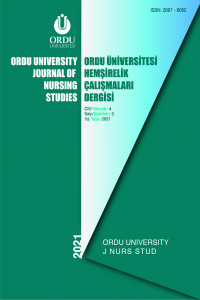Hemşirelik Öğrencilerinin İnfertiliteye İlişkin Bilgi Düzeyleri Tutumları ve Etkili Faktörlerin Belirlenmesi
Amaç: Bu araştırmanın amacı, hemşirelik öğrencilerinin infertiliteye ilişkin bilgi düzeylerinin, tutumlarının ve ilişkili faktörlerin belirlenmesidir
Yöntem: Araştırma örneklemini, Aralık 2019-Mart 2020 tarihleri arasında Türkiye’nin güneyinde bir devlet üniversitesinde öğrenim gören 550 hemşirelik öğrencisi oluşturdu. Araştırmanın verileri, öğrencilerinin kişisel özelliklerini tespit etmeye yönelik Tanıtıcı Bilgi Formu, "İnfertilite Bilgi Testi" ve "İnfertiliteye Yönelik Tutum Ölçeği" kullanılarak toplandı. Elde edilen veriler yüzde değerler, Student’s t-test, Tukey and ANOVA test kullanılarak değerlendirildi.
Bulgular: Araştırmada hemşirelik öğrencilerinin yaş ortalamaları 21.15±1.99'dur. Öğrencilerin %28.4’ünün üçüncü sınıfta öğrenim gördüğü, %58.4’ünün kadın olduğu ve %67.8’inin Güneydoğu Anadolu Bölgesinde doğduğu belirlendi. Araştırmada hemşirelik öğrencilerinin İnfertilite Bilgi Testi toplam puan ortalamalarının “19.23±6.48”(min=0- max=31), İnfertiliteye Yönelik Tutum Ölçeği toplam puan ortalamalarının “46.00±7.59”(min=16-max=60) olduğu saptandı. Öğrencilerinin sınıfları, doğdukları bölgeler, ailede infertil birey olma ve gelecekte çocuk sahibi olma durumlarına göre İnfertilite Bilgi Testi puan ortalamaları arasındaki fark istatistiksel olarak anlamlı bulundu (p
Anahtar Kelimeler:
İnfertilite, hemşirelik öğrencileri, bilgi düzeyi, tutum
The Knowledge and Attitudes of Nursing Students Infertility and Determination of Factors Affecting These Variables
Objective: This study aims to determine the nursing students knowledge levels, attitudes and related factors about infertility.
Methods: The research sample consisted of 550 nursing students studying at a state university in the south of Turkey between December 2019 -March 2020. The Introductory Information Form of the students, "Infertility Knowledge Test" and "Attitude Scale Towards Infertility" were collected in connection with the research. The obtained data were evaluated using percentage values, Student's t-test, Tukey and ANOVA tests.
Results: The mean age of the students was 21.15±1.99. It was determined that 28.4% of the students were educated in the third grade, 58.4% were women and 67.8% were born in the Southern Anatolia Region. In the study, it was determined that the total mean scores of the Infertility Knowledge Test of the nursing students were "19.23±6.48"(min=0- max=31), and the total mean score of the Attitude Scale towards Infertility was 46.00±7.5 (min=16- max=60), The difference between the mean scores of the Infertility Knowledge Test was found to be statistically significant according to the class of the students, their region of birth, being an infertile individual in the family and having children in the future (p
Keywords:
infertility, nursing students, knowledge level, attitude,
___
- Ali S, Sophie R, Imam, AM, Khan FI, Ali SF, Shaikh A, Farid HS. (2011). Knowledge, perceptions and myths regarding ınfertility among selected adult population in Pakistan: A cross-sectional study. BMC Public Health, 11(1), 760-766.
- Ashley A, Thomson MD, Meghan B, Shannon Z, Emily S, Philip M, Hahn RLR. (2016). Evaluating acquisition of knowledge about infertility using a whiteboard video. Journal of Obstetrics and Gynecology Canada, 38(7), 646-650.
- Assisted Reproductive Technology Fertility Clinic Success Rates Report (2013) Accessed on: 27.07.2021 https://www.cdc.gov/art/pdf/2013-report/art-2013-fertility-clinic-report.pdf
- Beji, NK. (2015) Women's Health and Diseases. 1. Baskı, İstanbul, Nobel Tıp Kitapevi, p. 113-118.
- Cooper TG, Noonan E, Eckardstein S. (2010). World Health Organization reference values for human semen characteristics. Human Reproduction Update, 16 (3), 231–245.
- Çağlar M, Oskay YÜ. (2020). Infertility and effects on sexual Life. JAREN, 6(1),157-162.
- Çakır D, Dağlar G., Bilgiç D. (2020). Determination of the department of nursing and midwifery students attitude for infertility. Balıkesir Health Sciences Journal, 9(2), 109-114.
- Erbil N, Bostan Ö, Kahraman AN. (2010). Hopelessness among infertile women and men. Turkiye Klinikleri Journal of Gynecology and Obstetrics, 20(4), 228-235.
- Hacettepe University Institute of Population Studies (2013). Turkey Demographic and Health Survey. Ankara, Hacettepe University Institute of Population Studies.
- Hammarberg K, Setter T, Norman RJ, Holden CA, Michelmore J, Johnson L. (2013). Knowledge about factors that influence fertility among Australians of reproductive age: A population-based survey. Fertility and Sterility, 99(2), 502-507.
- Karaca A, Ünsal G. (2012). The Effects of infertility on women’s mental health and role of psychiatric nursing. Journal of Psychiatric Nursing, 3(2), 80-85.
- Koropeckyj T, Çopur Z. (2015). Attitudes about childlessness and infertility treatments: A comparison of Turkish and American University students. Journal of comparative family studies, 46(3), 373-402.
- Küçükkaya B, Süt HK, Koyunoğlu Y, Kaya M, Yonğaç C. (2018). The knowledge and attıtudes of nursıng students about the factors affecting fertility. SAUHSD, 1(1), 52-64.
- Office on Women’s Health (2019) Accessed on: 27.07.2021, https://www.womenshealth.gov/a-z-topics/ infertility.
- Özçelik B, Karamustafalıoğlu O, Özçelik A. (2007). Psychological and psychiatric aspects of infertility. Anatolian Journal of Psychiatry, 8(2), 140-148.
- Siyez DM, Baran B, Kağnıcı DY, Esen E. (2018). Examining the knowledge and attitudes of university students about infertility and evaluating the effectiveness of infertility prevention psycho-education program and online education program. TÜBİTAK SOBAG 215K001 Proje Sonuç Raporu, İzmir.
- Siyez DM, Esen E, Baran B, Seymenler S, Kağnıcı DY, Siyez E. (2018). Development of the attitudes toward ınfertility scale (ATIS): validity and reliability study. Cukurova Medical Journal, 43(1), 173-180.
- Taşçı TK, Özkan S. (2007). University school for health sciences students' opinions about infertility. TAF Preventive Medicine Bulletin, 6(3), 1-7.
- Taşkın L. (2016). Obstetrics and women's health nursing. Ankara, Akademisyen Kitapevi, p.647-669.
- Yağmur Y, Oltuluoğlu H. (2012). Social support and hopelessness in women undergoing infertility treatment in eastern Turkey. Public Health Nursing, 29, 99-104.
- Yılmaz E. (2020). Attitudes toward infertility and empathy levels of nursing students. Turkiye Klinikleri Journal of Nursing Sciences, 12(2), 236-243.
- World Health Organization. Sexual and reproductive health: Infertility is a global public health issue. Accessed on: 29.11.2020, https://www.who.int/reproductivehealth/ topics/infertility/perspective/en/
- Yayın Aralığı: Yılda 3 Sayı
- Başlangıç: 2018
- Yayıncı: Ordu Üniversitesi
Sayıdaki Diğer Makaleler
Sibel Serap CEYLAN, Türkan TURAN, Çiğdem ERDOĞAN
Hülya BULUT, Sevil GÜLER, Nevra KALKAN, Burcu OPAK YÜCEL, Burçin IRMAK, Nihal YILDIZ EMRE
Geriatrik Cerrahide Ameliyat Sürecindeki Güncel Yaklaşımlar
Hemşirelik Öğrencilerinde İnternet Bağımlılığı
Ayşe DOST, Aysel KÖKCÜ DOĞAN, Derya ASLAN
Hemşirelerin Cinsel Mit İnançları ve Etkileyen Faktörler
Kerime Derya BEYDAĞ, Özlem KARABULUTLU
15-49 Yaş Evli Kadınların Aile Planlamasına İlişkin Tutumlarının Belirlenmesi
Feyza NAZİK, Şule MUMCU, Mehtap SÖNMEZ, Ayşe Nur YILMAZ, Özlem DOĞAN YÜKSEKOL
Özlem DOĞAN YÜKSEKOL, Mesude DUMAN, Pinar SOYLAR
Mahire Olcay ÇAM, Ece MUTLU SATIL
Çocukların COVID-19 Pandemisine İlişkin Algılarının Çizdikleri Resimlere Yansıması
